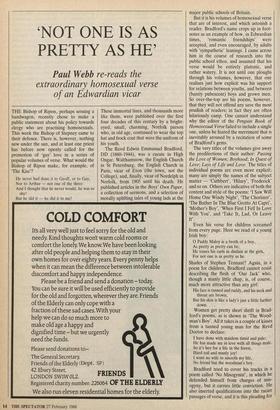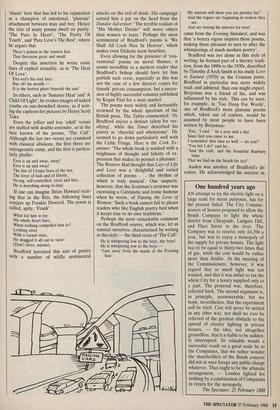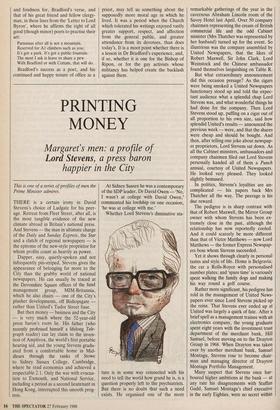NOT ONE IS AS PRETTY AS HE'
Paul Webb re-reads the
extraordinary homosexual verse of an Edwardian vicar
THE Bishop of Ripon, perhaps sensing a bandwagon, recently chose to make a public statement about his policy towards clergy who are practising homosexuals. This week the Bishop of Stepney came to their defence. There is, however, nothing new under the sun, and at least one priest has before now openly called for the promotion of 'gay' love in a series of popular volumes of verse. What would the Bishop of Ripon make, for example, of `The Kiss'?
He never had done it to Geoff, or to Guy, Nor to Arthur — not one of the three: And I thought that he never would, he was so shy!
But he did it — he did it to me!
These immortal lines, and thousands more like them, were published over the first four decades of this century by a bright- eyed, small, charming, Norfolk parson who, in old age, continued to wear the top hat and frock coat that were the uniform of his youth.
The Revd Edwin Emmanuel Bradford, DD (1860-1944), was a curate in High Ongar, Walthamstow, the English Church in St Petersburg, the English Church in Paris, vicar of Eton (the town, not the College), and, finally, vicar of Nordelph in Norfolk, from 1905 until his death. He published articles in the Boys' Own Paper, a collection of sermons, and a selection of morally uplifting tales of young lads at the
major public schools of Britain.
But it is his volumes of homosexual verse that are of interest, and which astonish a reader. Bradford's name crops up in foot- notes as an example of how, in Edwardian times, 'romantic friendships' were accepted, and even encouraged, by adults with 'sympathetic' leanings. I came across him in the course of research into the public school ethos, and assumed that his verse would be entirely platonic, and rather watery. It is not until one ploughs through his volumes, however, that one realises just how explicit was his support for relations between youths, and between (barely pubescent) boys and grown men. So over-the-top are his poems, however, that they will not offend any save the most prudish of readers; in fact they are often hilariously camp. One cannot understand why the editor of the Penguin Book of Homosexual Verse failed to include a single one, unless he feared the merriment that is inevitably aroused by a recitation of some of Bradford's gems.
The very titles of the volumes give away the predilections of their author: Passing the Love of Women; Boyhood; In Quest of Love; Lays of Life and Love. The titles of individual poems are even more explicit; many are simply the names of the subject matter — 'Cuthbert', 'Hilary', 'Frederick' and so on. Others are indicative of both the content and style of the poems: 'I Saw Will Home One Windy Night', 'The Chorister', `The Bather In The Blue Grotto At Capri', `Mother's Boy', 'When First I Fell In Love With You', and 'Take It, Lad, Or Leave It'.
Even his verse for children screamed from every page. Here we read of a young Irish boy:
0 Paddy Maloy is a broth of a boy, As pretty as pretty can be; He tosses his curls in disdain at the girls, For not one is as pretty as he.
Shades of Stephen Tennant? Again, in a poem for children, Bradford cannot resist describing the flesh of 'Our Jack' who, though a manly little chap, is, of course, much more attractive than any girl: His face is tanned and ruddy, and his neck and throat are brown, But his skin is like a lady's just a little further down. . .
Women get pretty short shrift in Brad- ford's poems, as is shown in 'The Wood- man's Boy'. All it takes is a couple of kisses from a tanned young man for the Revd Doctor to declare: I have done with maidens timid and pale; He has made me in love with all things male. So it's hey for a life in the forest, Hard toil and manly joy!
I want no wife to smooth my life, No friend but the woodman's boy.
Bradford tried to cover his tracks in a poem called 'No Misogynist', in which he defended himself from charges of mis- ogyny, but it carries little conviction. He also inserted qualifications into the racier passages of verse, and it is this pleading for `chaste' love that has led to his reputation as a champion of emotional, 'platonic' attachment between man and boy. Hence the title of many poems dwell on purity: `The Pure In Heart', 'The Purity Of Youth', and 'Pure Love's The Best', where he argues that
There's poison in the wanton kiss
That threatens great and small.
Despite this assertion he wrote some lines of explicit sexuality, as in 'The Heat Of Love':
Fire-red's his rosy face: But oh! his mouth - It is the hottest place beneath the sun!
In others, such as 'Summer Heat' and 'A Child Of Light', he evokes images of naked youths on sun-drenched shores, as if writ- ing the captions for pictures by Henry Scott Tuke.
Even the jollier and less 'adult' verses are stuffed with double-entendre, as in the best known of his poems, 'The Call'. Although the last two verses are crammed with classical allusions, the first three are outrageously camp, and the first is particu- larly phallic:
Eros is up and away, away!
Eros is up and away!
The sbn of Urania born of the sea, The lover of lads and of liberty, Strong, self-controlled, erect and free, He is marching along to-day)
If one can imagine Brian Howard recit- ing that in the Ritz, the following lines conjure up Frankie Howerd. The poem is called, aptly, 'Frank':
What led him to lay His whole heart bare, When nothing compelled him to?
Looking away With a vacant stare, He dragged it all out to view!
(Don't titter, missus).
Bradford leavened this sort of poetry with a number of wildly sentimental attacks on the evil of drink. His campaign earned him a pat on the head from the Dundee Advertiser: 'The terrible realism of "His Mother Drinks" will move others than women to tears.' Perhaps the most sentimental of Bradford's poems is 'We Shall All Look Nice In Heaven', which makes even Dickens seem heartless.
Even allowing for the presence of 'con- ventional' poems on moral themes, it seems incredible to a modern reader that Bradford's bishop should have let him publish such verse, especially as this was not the case of a few discreet copies for friends' private consumption, but a succes- sion of highly successful volumes published by Kegan Paul for a mass market.
The poems were widely and favourably reviewed by the whole spectrum of the British press. The Tablet commented: 'Dr Bradford enjoys a distinct talent for ver- sifying', while the Times described his poetry as 'cheerful and wholesome'. He seemed to go down particularly well with the Celtic Fringe. Here is the Cork Ex- aminer: 'The whole book is marked with a brightness of thought and felicity of ex- pression that makes its perusal a pleasure.' The Western Mail thought that Lays of Life and Love was a 'delightful and varied collection of poems . . . the rhythm of which is truly musical'. One suspects, however, that the Scotsman's reviewer was exercising a Calvinistic and ironic humour when he wrote, of Passing the Love of Women: 'Such a book cannot fail to please readers who like English poetry best when it keeps true to its own traditions.'
Perhaps the most remarkable comment on the Bradford oeuvre, which was, let us remind ourselves, characterised by writing in this style — the third verse of 'The Call':
He is whispering low to the boys, the boys!
He is whispering low to the boys - `Turn away from the maids of the Evening Star: My mirrors will show you are prettier far!' And the rogues are beginning to reckon they are, And are buying his mirrors for toys!
came from the Evening Standard, and was that 'a breezy vigour inspires these poems, making them pleasant to turn to after the whimperings of much modern poetry'.
Bradford was not alone in this style of writing; he formed part of a literary tradi- tion, from the 1890s to the 1930s, described by Timothy d'Arch Smith in his study Love in Earnest (1970) as the Uranian poets. Bradford in particular was more widely read, and admired, than one might expect. Betjeman was a friend of his, and was influenced by his style. This can be seen, for example, in 'Too Deep For Words', one of Bradford's more platonic poems which, taken out of context, would be assumed by most people to have been written by Betjeman:
`Eric,' I said, "tis a year and a day Since first you came to me.
I remember that time so well — do you?' 'You bet I do!' said he, `And the crab, and the beautiful Banbury buns That we had .on the beach for tea!'
Auden was another of Bradford's de- votees. He acknowledged his interest in, and fondness for, Bradford's verse, and that of his great friend and fellow clergy- man, in these lines from the 'Letter to Lord Byron', where he affirms the right of all good (though minor) poets to practise their art:
Parnassus after all is not a mountain, Reserved for Al climbers such as you; It's got a park. It's got a public fountain. The most I ask is leave to share a pew With Bradford or with Cottam, that will do.
Bradford's success as a poet, and his continued and happy tenure of office as a priest, may tell us something about the supposedly more moral age in which he lived. It was a period when the Church which tolerated his writings enjoyed vastly greater support, respect, and affection from the general public, and greater attendance from its devotees, than does today's. It is a moot point whether there is a lesson in Dr Bradford's experience, and, if so, whether it is one for the Bishop of Ripon, or for the gay activists whose militancy has helped create the backlash against them.




















































 Previous page
Previous page